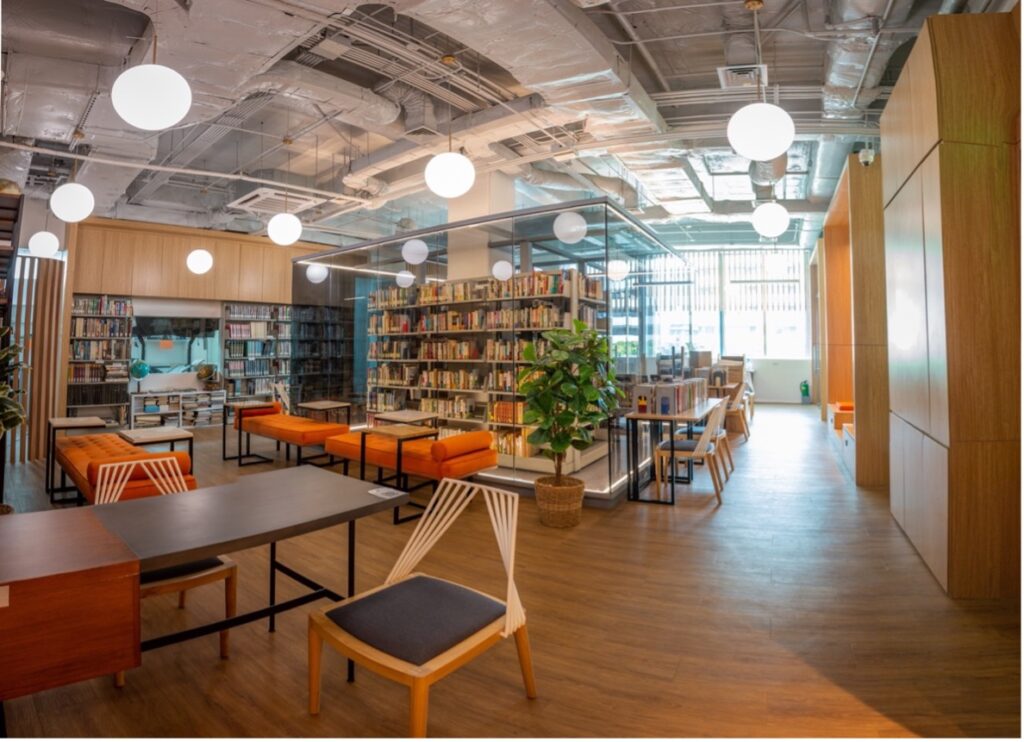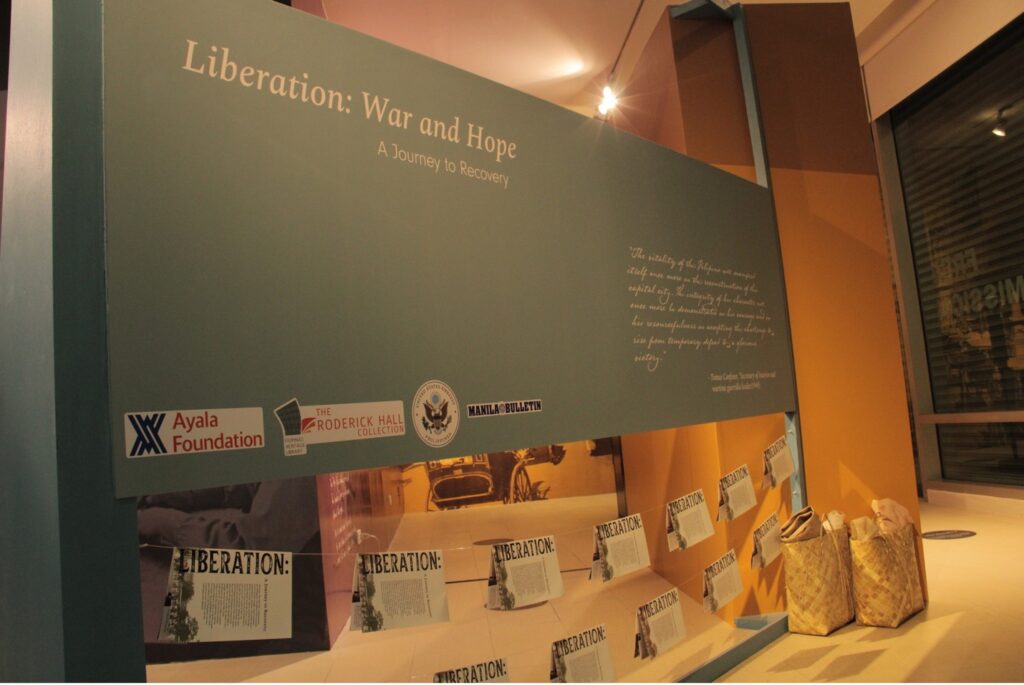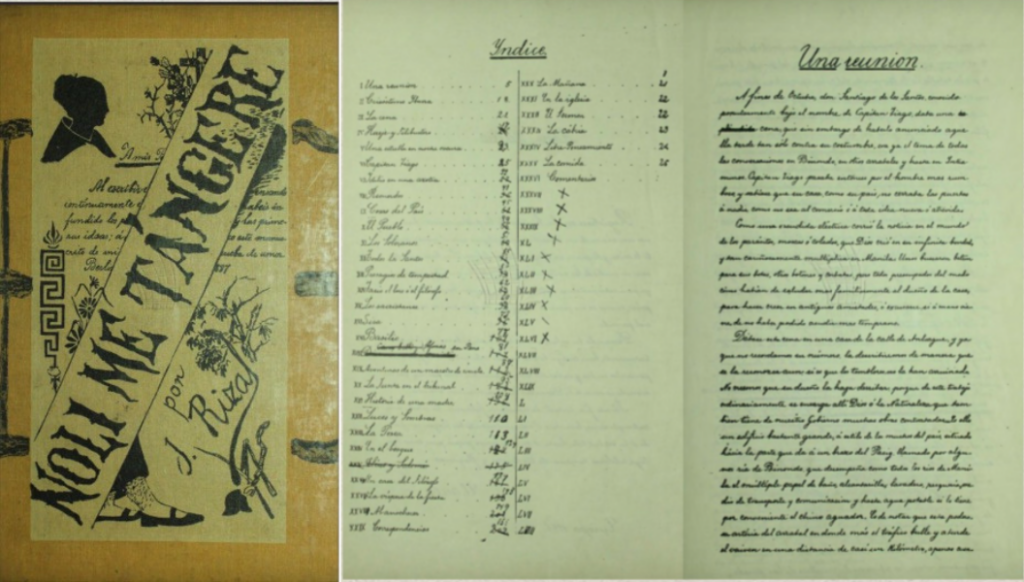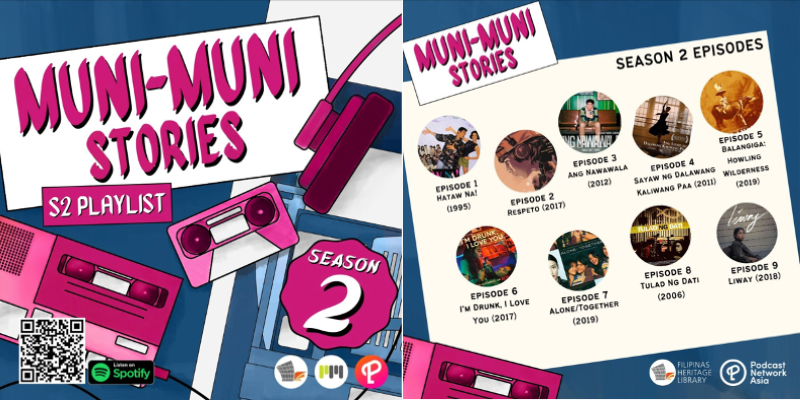“History is who we are and why we are the way we are.” — Author and historian David McCullough
To know the past and ongoing story of the Filipinos is to understand who they can become. Preserving the country’s documentary treasures is one of the missions of the Filipinas Heritage Library (FHL), a part of Ayala Foundation’s Arts and Culture Division. Using an omnichannel approach, FHL aims to reach local and global audiences, stoking interest in Philippine heritage. Established in 1996, the library is a comprehensive resource center of books, documents, photos, videos, and audio that help explain what it means to be Filipino.

Located on the 6th floor of the Ayala Museum, the Filipinas Heritage Library houses contemporary and rare materials on Philippine art, history, and culture.
At the heart of the library is the Roderick Hall Collection, which showcases the trials and tribulations of the Philippines during World War II. Hall, a beloved patron of the library and World War II survivor, dedicated his life’s work to honoring fellow survivors and veterans by collecting various resources now housed at FHL. The Rod Hall collection features over 2,000 works on a vast array of topics: military history, biographies and memoirs, periodicals, and even creative pieces. From May 27 to October 23, 2022, FHL hosted a World War II exhibit to commemorate the 75th anniversary of the end of the war. Funded by a grant from the U.S. Embassy in the Philippines, Liberation: War and Hope engaged visitors with materials that paid tribute to those who lived before, during, and after the deadliest war in history.

The exhibit ‘Liberation: War and Hope’ traced a journey of renewal, moving from the devastation of war to the hope brought by rebuilding
As part of the complementary programming, FHL curated webinars and workshops to support the Liberation: War & Hope exhibit. “Liberation Talks” was a series of online events focusing on the day to day life of World War II, both during its course and its aftermath. Kickstarting the series was the panel of historians Rico Jose, Cecilia Gaerlan, and James Scott in “The Aftermath of WW2”. This webinar discussed the effects of the war on the Philippines and its people, particularly veterans and guerillas. The series continued with food historian Felice Prudente Sta. Maria’s exploration of food culture in “Dreams of Cake and Ice Cream: Coping with Hunger in World War 2”. The first half of these talks concluded with another panel featuring Paulo Alcazaren, Meloy Mabunay, and Noelle Rodriguez in “Shaping City Sense”. These historians explored the aesthetic and cultural changes in the cities of Makati, Iloilo, and Zamboanga as the country’s democracy evolved.
In 2022, “Liberation Talks” resumed with Nick Deocampo’s “Popcorn at the Barracks: Pinoy Movies and their Sign Systems”. This webinar tackled the cultural impact of the war through the popular medium of filmmaking. One of the most well-received webinars was “After the War: Fashioning the Philippines” by Mark Lewis Higgins. Higgins continued the exhibit’s theme of renewal by showing how fashion designer and National Artist Salvacion Lim Higgins breathed new life into Filipino fashion as the country entered a new era. The series concluded with “The War and the Transformation of the American Community in the Philippines” by Joseph P. McCallus. Using World War II as a turning point, the webinar charted the transformation of the American community and its relationship to the Filipino community from 1900 until the present.
Aside from World War II, FHL exhibits also celebrate other aspects of Filipino history, art, and culture. A good example would be The Revolutionary exhibit, which ran from May 19 to July 31, 2017. Featuring Nick Joaquin at 100 and Julio Nakpil at 150, this exhibit showcased the contributions of these two prominent artists to our rich heritage. Other noteworthy exhibits include the Hidden Cinema and Peek-a-Book in 2019, which tackled the history of the local film industry and the creative process of illustrators, respectively. To reach a wider audience, FHL also hosts online exhibits. Significant examples of 2022 virtual exhibits include Tara Vote! A Short History of Philippine Suffrage, Papuri: Reimagining the Holy, and A Long Road to Dignity.
Visitors to FHL can also find a variety of antique book collections and works by national heroes and artists. Foremost among these is Rizaliana, a collection of anecdotes, biographies, and novels written by, or related to, Dr. Jose Rizal. Various translations of his popular novel, Noli Me Tangere are one of the highlights of Rizaliana. Meanwhile, the Presidential Papers collection gives a glimpse into the life of two of our country’s leaders: President Elpidio R. Quirino and President Manuel L. Quezon. This collection contains public documents, photographs, and mementos. Recently, FHL also acquired letters from the 19th and 20th centuries written by Rizal, Marcelo H. del Pilar, and Graciano Lopez Jaena, among others.

Different versions of the Noli can be accessed at the library, including translations in Filipino, English, Japanese, and German.
Rare materials, described as those from 1945 or older, comprise a comprehensive collection of maps, books, and documents. These materials range from politics to the biographies of our national heroes. Certain items date as far back as the 1600s.
While FHL primarily focuses on books and written works, the library also pays tribute to the Philippines’s music industry with its expansive Himig Collection. The collection boasts over 5,000 digitized Filipino songs from the 1900s to the 1990s, including popular compositions by Freddie Aguilar and Francis Magalona.
Complementing the Himig Collection is Muni-Muni Stories, an award-winning podcast. The first season was made in collaboration with the OPM Archive, while Podcast Network Asia became a co-producer during Season 2. Muni-Muni Stories features interviews with popular Filipino singers and their families. Some of its most acclaimed episodes include its debut, “Celeste Legaspi — Saranggola ni Pepe,” and the tenth episode featuring UDD and their landmark song “Tadhana”.
Muni-Muni Stories serves not only to showcase our country’s popular artists and their songs but also to encourage people to appreciate our own music. “Music is not static, but rather something that continues to grow as more people listen to it,” Katrice Jalbuena, Associate Manager for FHL’s Program Development and Relationship Management, explained. “The musicians talk about their lives and careers, and how their particular experiences initially shaped the piece. At the same time, it’s acknowledged that these pieces grew beyond even the original intent of the musician. As more and more people listen to the piece, it develops layers of meaning that the artists themselves didn’t predict. Meanwhile the listener, the knowledge seeker, doesn’t just passively listen to a piece and try to interpret what the musician intended, but [they] also find their own meaning. As they actively listen, they add relevance to the piece by relating its history to their own present and future.”

The second season of Muni-Muni stories focused on official soundtracks of much-loved Filipino films
One of FHL’s most prized collections is the Retrato Photo Archive, a testament to the library’s never-ending digitization project. Retrato is an extensive repository of nearly 40,000 images detailing Philippine life, history, and culture from the 15th century until the 1970s. The photos, which are accessible online, range in subject from clothing and adornments to religious objects.
Students and knowledge seekers will find a plethora of research materials at FHL. The Filipinas Heritage Library – Educational Resources Directory (FHL-ERD) is a comprehensive directory of FHL’s entire collections. It is continuously updated, providing information in a user-friendly way. As a site of digital resources, FHL crosses the boundaries associated with traditional spaces, thereby promoting greater access to its holdings. Its audience is both the local and global Filipino, as well as the international community.
Education and awareness have always been FHL’s mission. “By its nature, a library is a resource meant for everyone,” said Programs Manager Charlene Diaz. “However, FHL’s collections are especially suited to researchers and scholars with specific interests in Philippine history, culture, and the arts. One of our challenges is to promote our holdings to a younger audience and thereby make FHL collections more ‘hip’ and ‘appealing.’ Social media reach has been our best gateway to the Gen Z crowd. FHL hopes to nurture their growing awareness of Philippine history and culture in our future projects.”
The library is both memory keeper and advocate of Philippine history and culture. As a gift to the Filipino people, it seems to offer ways of reflecting on ongoing journeys in the homeland and across the globe. It aims to grant diverse points of access for exploring the Filipinos’ past and changing lives
Filipinas Heritage Library is open from Wednesdays to Saturdays (10:00 AM – 6:00 PM), and is located on the 6F Ayala Museum, Makati Avenue cor. De la Rosa St., Makati City. You may book an appointment in advance at https://www.filipinaslibrary.org.ph/booking/
Support Filipino arts and culture by making a donation to the Filipinas Heritage Library. To contribute, visit our donation portal or use BPI eDonate.

